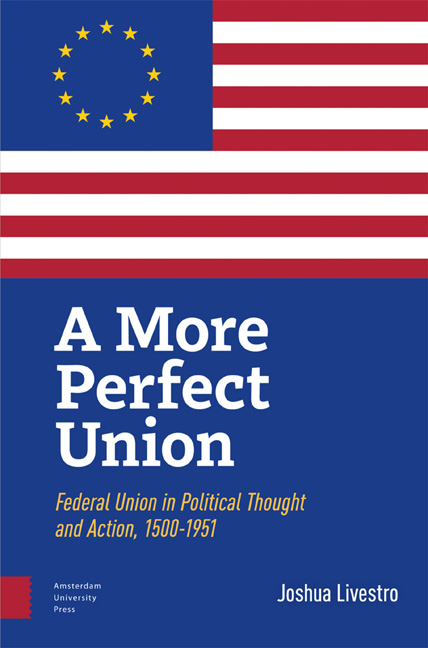Book contents
- Frontmatter
- Dedication
- Contents
- Introduction
- 1 The Machiavellian Moment: On Modes of Expansion
- 2 A Taxonomy of Unions
- 3 The European Republic
- 4 The American Moment
- 5 The Necessity of Compromise
- 6 The European Congress as Peace Pact
- 7 Germany, from Staatenbund to Bundesstaat
- 8 The Peace Movement’s Federal Utopianism
- 9 Peace through Union
- 10 Europe’s Anti-Federalist Moment
- 11 The Hour for Union
- 12 Europe’s Federalist Moment
- Conclusion
- Epilogue: The United States of Europe
- Acknowledgements
- Index
Introduction
- Frontmatter
- Dedication
- Contents
- Introduction
- 1 The Machiavellian Moment: On Modes of Expansion
- 2 A Taxonomy of Unions
- 3 The European Republic
- 4 The American Moment
- 5 The Necessity of Compromise
- 6 The European Congress as Peace Pact
- 7 Germany, from Staatenbund to Bundesstaat
- 8 The Peace Movement’s Federal Utopianism
- 9 Peace through Union
- 10 Europe’s Anti-Federalist Moment
- 11 The Hour for Union
- 12 Europe’s Federalist Moment
- Conclusion
- Epilogue: The United States of Europe
- Acknowledgements
- Index
Summary
In his Alarums and Excursions, the Dutch political philosopher Luuk van Middelaar described the Brexit vote of June 2016 as a moment of existential crisis for the European Union: “The divorce disturbed its long-cherished self-image and for a moment it feared for its survival” (Van Middelaar 488). In the end, the EU's will to survive helped it to steer a course out of the crisis, towards a renewed sense of purpose.
Van Middelaar proceeded to give metaphysical meaning to this crisis by calling it a “Machiavellian moment,” a reference to arguably one of the finest works of intellectual history from the past half-century, written by the New Zealand historian J. G. A. Pocock. Pocock's study reconstructed the rise of an Atlantic tradition of republican political thought that linked the Renaissance Florence of Niccolo Machiavelli to the England of the Civil War period and the America of the Revolutionary era.
As Van Middelaar read it, the Machiavellian moment was an episode in which, “[o]ut of the experience of a democratic republic's own transience and mortality there may arise a political will to manifest itself as a sovereign player in historical time” (Van Middelaar 486). This European Machiavellian moment, which according to him effectively started with the international banking crisis of 2008, would see the Union gradually become an independent actor on the world stage. Like the original earlysixteenth- century Machiavellian moment, Van Middelaar claimed, this European moment also had an aspect of “theological liberation” (487), the theology in this case being the European belief in the idea of the Union's perpetuity, and in the universality of the ideals on which it was founded. Freed from these eschatological shackles, Europe could now, finally, as the former German Chancellor Angela Merkel put it, “take its destiny into its own hands” (512). Using Machiavelli's image of fortune as a stream, Van Middelaar placed the EU squarely in the middle of this stream, ready to respond to the changing tides – “an existential experience” (487).
It is difficult to disagree with Van Middelaar's assertion that the EU needs to fully grasp its “Machiavellian moment” and develop the capacity to become a credible actor on the world stage. And his point is well made that the EU has only been able to survive by periodically ignoring its own ground rules, through acts of pure political creativity.
Information
- Type
- Chapter
- Information
- A More Perfect UnionFederal Union in Political Theory and Practice, 1500-1951, pp. 11 - 22Publisher: Amsterdam University PressPrint publication year: 2024
